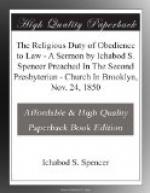These are some of the things which appear necessary, in order to justify violent resistance of Law. They must all exist, or such resistance would be criminal,—contrary to reason, to benevolence, and to Christ.
It is not a thing to be expected at all among mankind, that all laws should be right, or “just and equal.” Human legislation must be expected to bear the marks of an imperfection, which attaches itself to everything human. If obedience to government were obligatory, only on the condition that all the laws of that government are just; then, such obedience would mean nothing at all, and every man would be absolved from all allegiance to the government, and from all obligations to obey. Such is man, so limited his wisdom and so imperfect his holiness, that human laws must necessarily be imperfect, and must, therefore, necessarily operate hardly in some instances, upon more or less of the people. It is impossible, that the thing should be otherwise—in the very nature of the case, it is impossible. And if every individual were allowed to be the judge in his own case, whether or not the law operated so hardly upon him that he might disobey; then his obligation to obedience would mean just nothing at all, and Law would be nothing more to him than mere advice. It might be very good advice, but he might spurn it, if he chose. I may think it hard and unjust upon myself, that, in the great “Empire State,” by a sort of “bill of attainder,” (I know not what else to call it,—I suppose I must not call it a slave law,) I am prohibited from holding any “office of profit or trust,” because I will preach the gospel, and people will hear me;—but notwithstanding this law, (which you will not allow me to call by any hard name,) you think me under obligation to obey the government,—and I think so too. I shall not rebel.
The execution of the Law also, must necessarily be imperfect, for the same great reason—human imperfection: judges and jurors are not infallible. But, what then? God knew all this when he ordained human government, and commanded us to be subject to it. Such government, with all its unavoidable imperfection and errors, on the whole is beneficial—indispensable—we could not do without it.—And rarely, very rarely indeed, is there a single instance of an individual man, here or beyond the Potomac, whom Law has injured more than it has benefited. Even if that Law unjustly takes away his liberty or his life, it may have done him more good than injury; his liberty or his life might have been sooner and more cruelly destroyed without it. It would be hard to prove the contrary, in any one case that ever existed or ever will, here or elsewhere.




